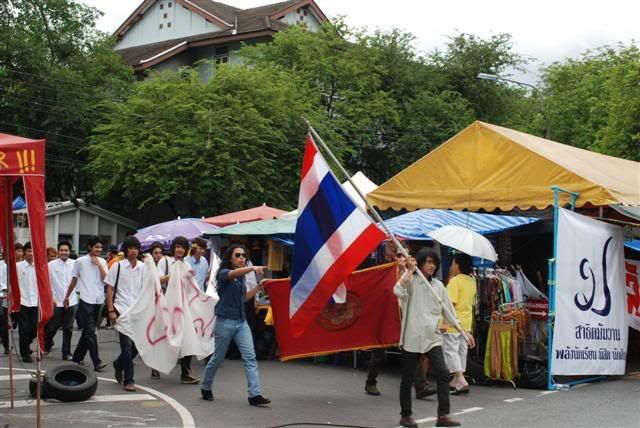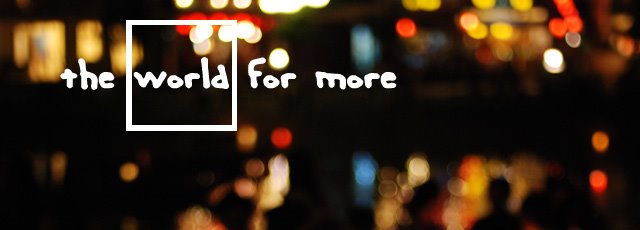riding the storm surge out to sea
50cc engine won't take me far
i've come to realize that
the city i'm in is where i could be
asleep yet awake in the same breath.
there's a smoldering heat,
and a heavy haze in the air
what's the talk here among the elite?
image, status, riches, and selfish ends
what about the rural migrants selling lottery tickets,
or the man with the burnt face and missing limbs,
or the children forced to work on the streets,
or human beings being sold in broad daylight?
this is the arm of the machine
enjoy this exotic splendor they say
life here is cheap
get rich, worry later
work the system they say
for we are things not people.
riding the storm surge out to sea
50cc engine won't take me far
but i've got to get away from all this indifference
to a place where i know it could be different
where what i do matters so much more,
where people are not as exploited,
where life and death don't occur in the same breath.
Tuesday, April 21, 2009
Thursday, March 26, 2009
alleyway jazz
I had headphones on my ears, the song set on repeat to an old jazz tune I've long forgotten. I knew precisely what I was doing--walking down that narrow alleyway, looking for a point of escape, creating a second reality. On a pale yellow wall where the sunlight was casting blotches of color in between the shadows, I stopped to look up. There in that brief moment, the piano began to echo a familiar tune. In the stillness, a middle aged woman dressed in purple pajamas with a conical hat atop her head motioned for me to move. Out of the way, she was gesturing--work to do, a family to feed, and so on. Pressing my back to the wall, the wheels on her vendor cart blurred off into the distance. Finding repose, I continued my walk and turned the corner. On the grey pavement, a sparrow had fluttered into existence. A female voice began to sing of a place that only existed in dreams. After a bit of mutual disinterest, it took flight into an unseen empty space. I scratched my head. Further down, squatting against a blue iron gate were two children busying themselves with some rocks they had found.
Wednesday, November 12, 2008
sự phát triển--development, or lack thereof
“Social responsibilities and obligations are very necessary because people must obey what society puts forth in order to benefit its residents; everyone must follow the laws for society to prosper”
- Undergraduate Student at University of Social Sciences and Humanities HCMC, 2007.
A woman from Thanh Hoá and her four year old son sell chewing gum and tissue paper to Western tourists in the backpacker area of Hồ Chí Minh City outside a well-known drinking establishment. Occasionally the boy dances on the tables, and tugs on sleeves to draw a smiling eye in hopes of making a sale. Western tourists, in all their worldliness, frequently take this opportunity to photograph the entertaining little yellow monkey. How great it must be to visit such a large zoo. With tears forming around the edges of her eyes, she explains how her son is a quick learner. Coming from a poor sea-side community of subsistence farmers in the north often devastated by natural disaster, she and her young son migrated to this urban center over two years ago after the government did not distribute an adequate level of disaster relief aid to help them rebuild their lives. She has left behind a husband and two high-school aged children in order to seek opportunities for additional income to support her family. Each month she sends her earnings back home. Her only ambition in life is to see all of her children complete their schooling and use their hard-earned educations to open doors which she has never had access to. Dance little boy, these tourists love the real Việt Nam.
A group of elderly and middle-aged women from Long An position themselves on scraps of cardboard under the shade of trees and buildings on the street named after a national heroine, Võ Thị Sáu, who once said while under French imprisonment: “I am a patriotic person without offences—your military, which steals from my country and kills my people, are the ones who have committed offences.” These women are holding hand-written messages of protest on pieces of cardboard and tattered rice bags—their livelihoods are now virtually non-existent, their land has been taken from them in a system that feeds itself through corrupt means that in effect pushes the poor further out into the socioeconomic periphery. Upon approaching them, two of the women stand up with their signs to show their plight. A man dressed in light blue colored clothing, holding a walkie-talkie and likely a plain-clothes police officer or local gangster, tells the woman to put away the sign. They’re not taking any photographs, she protests. Let them read this, they say, and understand what is being done to us. A bulky man with closely shaved hair and a frown on his face crosses the street—it looks like it is time to leave. A steady stream of cars and motorbikes pass by. No one else stops. How ironic, what would the national heroine, who the street is named after, say?
On a street corner, five hours before the next sunrise, a group of fifteen or so police officers encircle a street vendor’s cart which has been securely chained to a commercial building. All the uniforms’ eyes are on the street vendor’s cart with their hands crossed behind their backs in a similar manner. The street vendor, who has sold coffee, tea, and other beverages in this very spot for the past fourteen years, has gone home for the night. From these earnings, she has been able to afford her children’s education—asleep now her children must be with their dreams, before waking for school the next morning. There is an air of excitement among the uniforms as the chain linked to the building’s iron barred windows is frantically and tragically being sawed away. With success, the uniforms gleefully push the street vendor’s cart and plastic chairs back to the local station. They walk as if they have achieved greatness. Perhaps if she can afford it, she can pay them to get her cart back. All this glorious development which enables society to achieve further socioeconomic gains—who is included in this model and what happens to those who don’t fit quite so well in the grand scheme? The night-time cigarette vendor, who has been told by the uniforms to move his cart down the street or face similar consequences, later asks how the poor working peoples such as him, would be able to afford to open businesses such as the twenty-four hour convenience store located down the street. He feels that were he to move his cart down the street, he would be infringing on other peoples’ livelihoods who are already working in that space. Without knowledge of the laws which dictate such action, he reluctantly obeys these uniforms who state that he is but a simple laborer who should not question their authority. The xe ôm drivers who work together on this street corner lament that something very similar is happening to them—they too are being told to move. What are the cigarette vendor and others like him to do when they do not possess the taxable capital in line with the development strategies of the socialist republic?
Wednesday, October 29, 2008
Friday, September 12, 2008
within frames

A point of reference frames the world. Life according to a social structure not fully analyzed is common in these parts as is elsewhere, and carries on into the political and economic spheres. The hierarchical society and often times Confucian mindset of the population which unquestioningly bows before authority, coupled with the education system wherein a scholar is often nothing more than a puppet which legitimizes the system brings forth a certain degree of stagnation.
Take for example, the case of the tuk tuk driver and the special 20 baht government tour. Anan is his name, he's a simple sort of fellow with a wife and kids. When asked, he seems concerned about the current state education policy wherein he must pay for his child's future secondary schooling. There's a catch though, there always is. The point being that this tour as advertised by a stranger on the street, likely a commission seeking employee of the local tourist authority, is indeed too good to be true. Sure, the standing Buddha and neighborhood wat are sites to see, but the later induced tourist consumer-based visits is a ploy to get much needed foreign dollars into the hands of those awarded government contracts. The way this system works is that the tuk tuk driver gets a five liter gas card from each of these would-be tailor and souvenir shops advertising the utmost quality in fabrics and likely sweat-shop speed quickness. However, being intent on buying nothing and having the status as an unemployed recent graduate does not work in their favor. The issue here is three-fold, that being: the tuk tuk driver will likely never rise out of the lower economic bracket while his attempts at such legitimizes a government that would prefer to see him stay where he is, and the present model of globalization brokers a sense of continued Western dominance over a peoples who serve as producers of exported commercial goods and pleasure outlets for tourists with stronger currencies and heavier pockets.

In this light, the words of some of those aligned with the PAD within the intellectual class whom we spoke to today inside of the Prime Minister's Office Compound have just cause--their aim is to see a change within their political system wherein the next leader will have to work towards the social welfare of the common people enabling them to achieve upward economic mobility rather than the present corrupt model dominating many political systems in this region in which public officials are in it for personal economic gain while seemingly perpetuating a government based upon nepotism. How this will all play out is still uncertain.
Subscribe to:
Posts (Atom)

.jpg)
